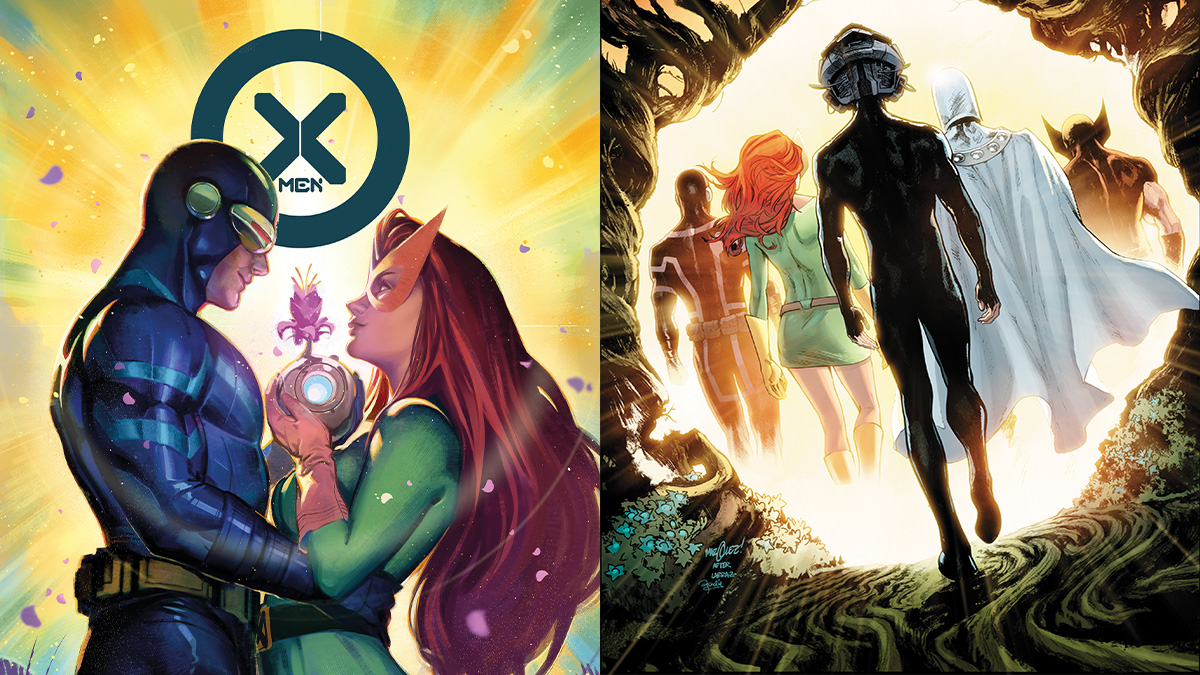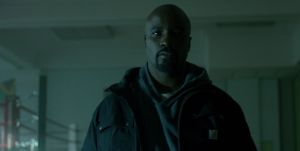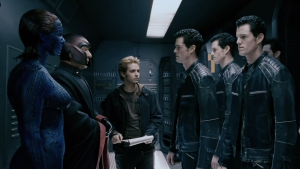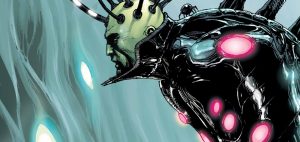
This article appears in the new issue of DEN OF GEEK magazine. You can read all of our magazine stories here.
As Marvel True Believers will tell you, writer Al Ewing’s style is a fascinating synthesis of six different comics traditions. He has all of the bombast of Jack Kirby at his Kirbyest, the taste for the occult of Grant Morrison, the unrestrained imagination of Jim Starlin, the visual language of Alan Davis mixed with Christopher Priest, and the methodical formalism of Jonathan Hickman.
Ewing started his career on 2000 AD books before quickly finding himself in the Marvel stable. After a multiverse-redefining run on Ultimates and giving Bruce Banner’s world a fresh coat of paint in Immortal Hulk, Ewing joined the X-Office to write several books, including X-Men Red and Resurrection of Magneto. Now, as Marvel prepares to release X-Men #35, the milestone 700th issue of Uncanny X-Men that’s also a farewell to the Krakoa story that has driven the X-line for the past five years, Ewing is looking back on his time with Marvel’s Merry Mutants.
“I’m always glad to hear that the whole era went down as well as it did,” Ewing says over Zoom, summing up his time on X-Men comics. Only two creators—Gerry Duggan and Ben Percy—have been on the Krakoa team longer than Ewing. Shortly after Jonathan Hickman pitched the revolutionary House of X/Powers of X event books that kicked off the Krakoa era in 2019, Ewing was brought on to tackle the biggest continuity swing from the relaunch. “I was [at a 2020 writers’ retreat in Chicago] as somebody who’d be putatively writing a Moira X book,” says Ewing. But the book that would have fleshed out the X-Men’s new immortal-ish nemesis never materialized, so Ewing pivoted to building links between the X-Universe and the larger Marvel cosmos in a series called S.W.O.R.D.
As part of his entry into Krakoa, Ewing was also invited into what will likely, in retrospect, be seen as the greatest strength of this collection of comics: the X-Slack, where Hickman’s team of X-Creators regularly workshopped their Krakoa stories. “When comics history gets around to recounting this, I think there’ll be a lot of stories told of how good that room was,” Ewing says. It was the X-Slack that helped him hammer out his initial S.W.O.R.D. story, taking it from a top-level idea that Ewing describes as “What if [half-alien, half-mutant secret agent] Abigail Brand is exactly who she always was?” and molding it into the character piece that, when all was said and done, ended up being arguably the definitive character piece for Storm, Magneto, and to a lesser extent, Apocalypse.
The plan is never, of course, to write the Storm story or the Magneto story, but Ewing says he had the sketch of the ideas for them in his head early on. Back when the office was planning Planet-Size X-Men (which covered the terraforming of Mars and the foundational scene setting for X-Men Red), Ewing says, “Gerry [Duggan, writer of Planet-Size] was like, ‘what do we want to put on Mars?’ I was like, ‘Oh, I need one thing…my thinking was that Magneto would retire from Krakoa, because he’d been through so much.’” And so Magneto’s Autumn Palace was planned from almost the minute Mars was conceived as the new mutant planet, which sowed the seeds for his heroic death in battle with Uranos in the Marvel crossover event AXE, and set up his seminal character study in Resurrection of Magneto. Giant redwoods from small seeds.
Through his work on the X-Men books, Ewing was also part of the team that helped popularize a new language for comics storytelling. During the Krakoa era, the X-books embraced “data pages”—prose pages laid out like charts, diary entries, text message chains between characters, wanted posters, gossip columns, and even galaxy-wide alerts, among other examples—as an innovative new way to tell comic book stories. Ewing has used data pages to great effect in his X-books as well as Immortal Hulk and is elated to see the concept spreading across the industry. “I was just flipping through recent Doom Patrol issues [and] they spoofed [data pages] over the issue!” Ewing says. “It’s in the consciousness, and that’s great because I love it when new comics vocabulary appears.
The writer believes many of the ideas introduced in the Krakoa era of X-Men will resonate throughout the medium for years to come. “There isn’t a single facet of Krakoa that I don’t in my heart of hearts believe that 5, 10 years down the line, some writer will be reading over what we did and go, ‘Oh man, I can use that,’” he says. “Nothing is forever in comics, but I do think this [group] was unique.”
For now, Ewing gets one last hurrah with his X-team in the 700th anniversary issue alongside legendary creators from X-Men’s past, such as Chris Claremont and Walt Simonson. But what’s next for the X-Men after that? Ewing’s confident that the transition to the next era of mutant stories—appropriately titled From the Ashes, as it picks up after the destruction of the mutant nation of Krakoa—will be a smooth one. “It was a great ride, [and] I’m sure the next X-Office will have great stories too. I’m certain of it.”
X-Men #35 hits stores on June 5.
The post Uncanny X-Men 700 Is an Epic, Star-Studded Farewell to Marvel’s Krakoa Era appeared first on Den of Geek.







